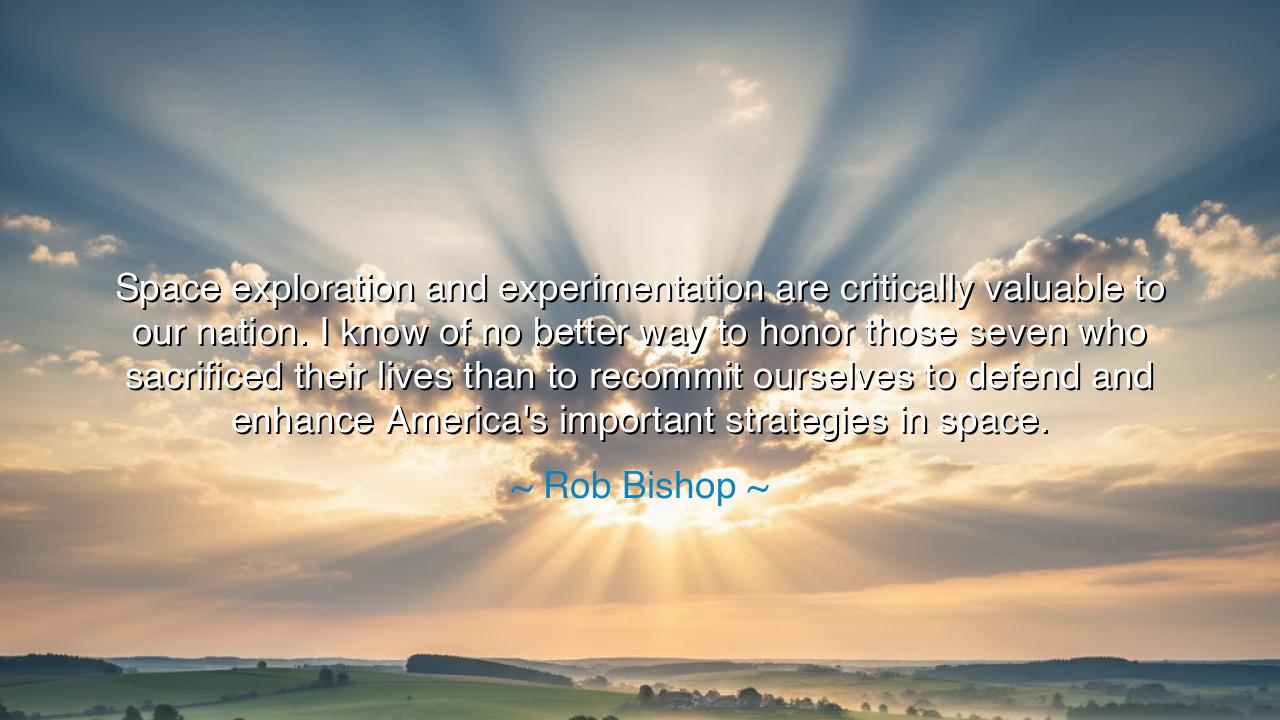
Space exploration and experimentation are critically valuable to
Space exploration and experimentation are critically valuable to our nation. I know of no better way to honor those seven who sacrificed their lives than to recommit ourselves to defend and enhance America's important strategies in space.






Hear, O seeker of truth, the solemn words of Rob Bishop: “Space exploration and experimentation are critically valuable to our nation. I know of no better way to honor those seven who sacrificed their lives than to recommit ourselves to defend and enhance America’s important strategies in space.” These words, spoken in remembrance of fallen astronauts, rise above mourning and into vision. They remind us that grief is not the end, but a call to action—that sacrifice must not be left barren, but must bear the fruit of renewed resolve.
The reference to “those seven” recalls the Space Shuttle Challenger disaster of 1986, when seven brave souls perished in the pursuit of discovery. They were teachers, pilots, scientists, explorers—men and women who dared to pierce the veil of the sky so that humanity might expand its knowledge. Their loss seared the heart of the nation, but Bishop’s words declare that the truest way to honor them is not to retreat in fear, but to recommit to the mission that claimed their lives. For progress is not preserved by silence, but by courage renewed after tragedy.
The meaning of space exploration is not merely in rockets and machines, but in what it represents: the hunger of humanity to rise beyond limitation, to understand creation, to secure the future of its people. Bishop calls it “critically valuable,” for he knows that the heavens are not only a field for science, but also a domain of strategy, vision, and survival. Just as the seas once determined the fate of empires, so too shall the skies and the stars shape the destiny of nations.
History confirms this truth. When Magellan set sail to circumnavigate the Earth, he and his crew faced death, storms, and the unknown. Many perished, yet their voyage transformed the map of the world forever. To honor their sacrifice was not to stay on safe shores, but to continue sending ships into the vast ocean. So it is with space: the pioneers who have fallen are like those sailors, whose deaths are not a warning to retreat but a reminder of the cost of discovery and the necessity of courage.
Bishop’s words also remind us of the unity forged in sacrifice. The Apollo 1 crew, who perished in a fire on the launch pad in 1967, and the Columbia astronauts who died upon reentry in 2003, are bound with the Challenger crew in one chain of sacrifice. Each tragedy shook the nation, yet each also led to reforms, innovations, and renewed dedication. The legacy of the fallen lives not only in memory but in every spacecraft that rises after them, in every experiment carried to orbit, in every new horizon reached.
The lesson is clear: do not let sorrow breed hesitation. Let it be a forge for determination. When others fall in the pursuit of the noble, their sacrifice must not end in silence. We must press forward, not to diminish their loss, but to sanctify it. In this way, their courage becomes immortal, woven into the onward march of human progress.
So I say to you, O child of tomorrow: when you encounter tragedy, do not turn away in fear. Remember Rob Bishop’s words—honor sacrifice by continuing the mission. Whether in science, in service, or in your own life, take the pain of loss and transmute it into purpose. For it is in this transformation that the fallen live on, and in this recommitment that humanity proves itself worthy of the stars.






AAdministratorAdministrator
Welcome, honored guests. Please leave a comment, we will respond soon